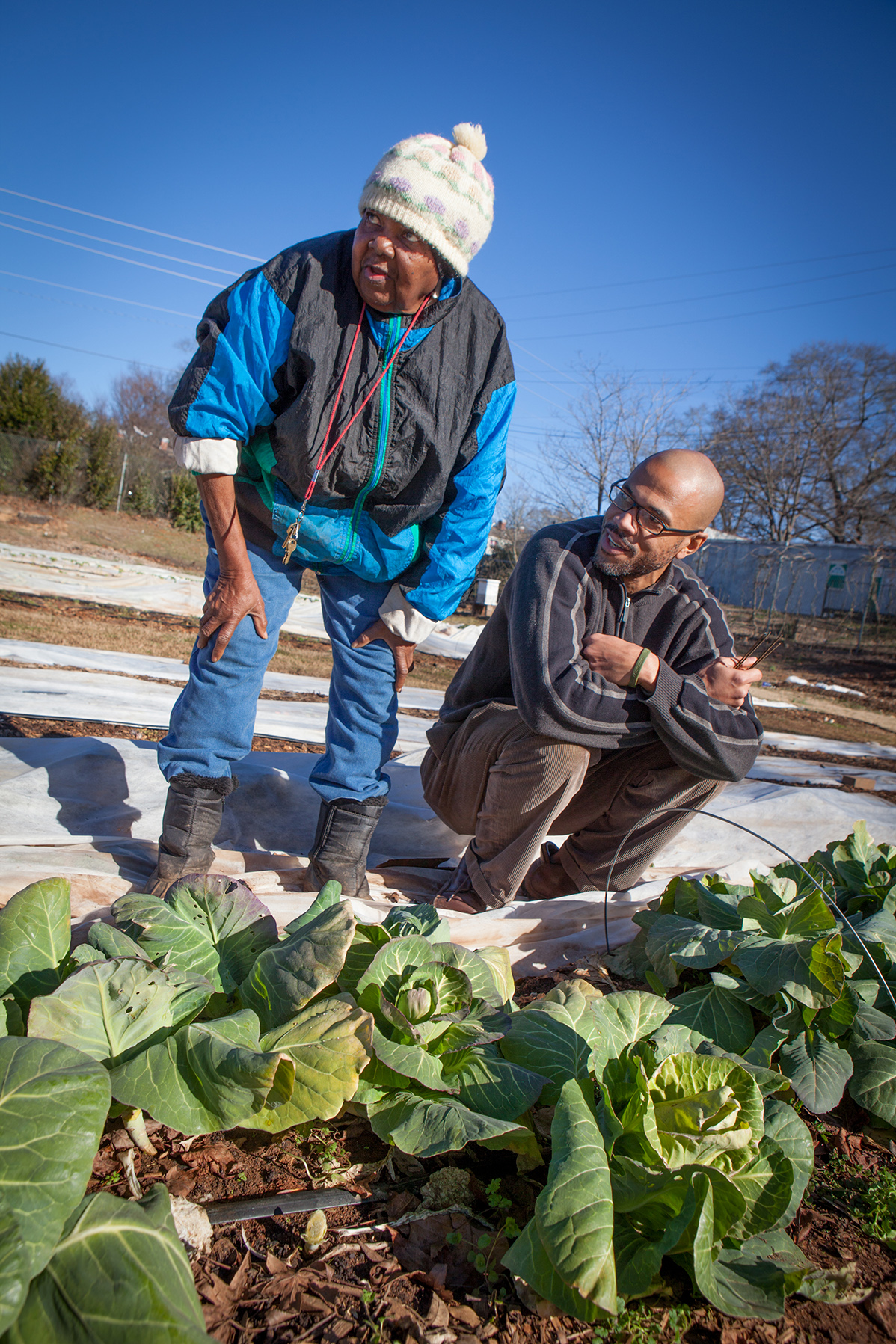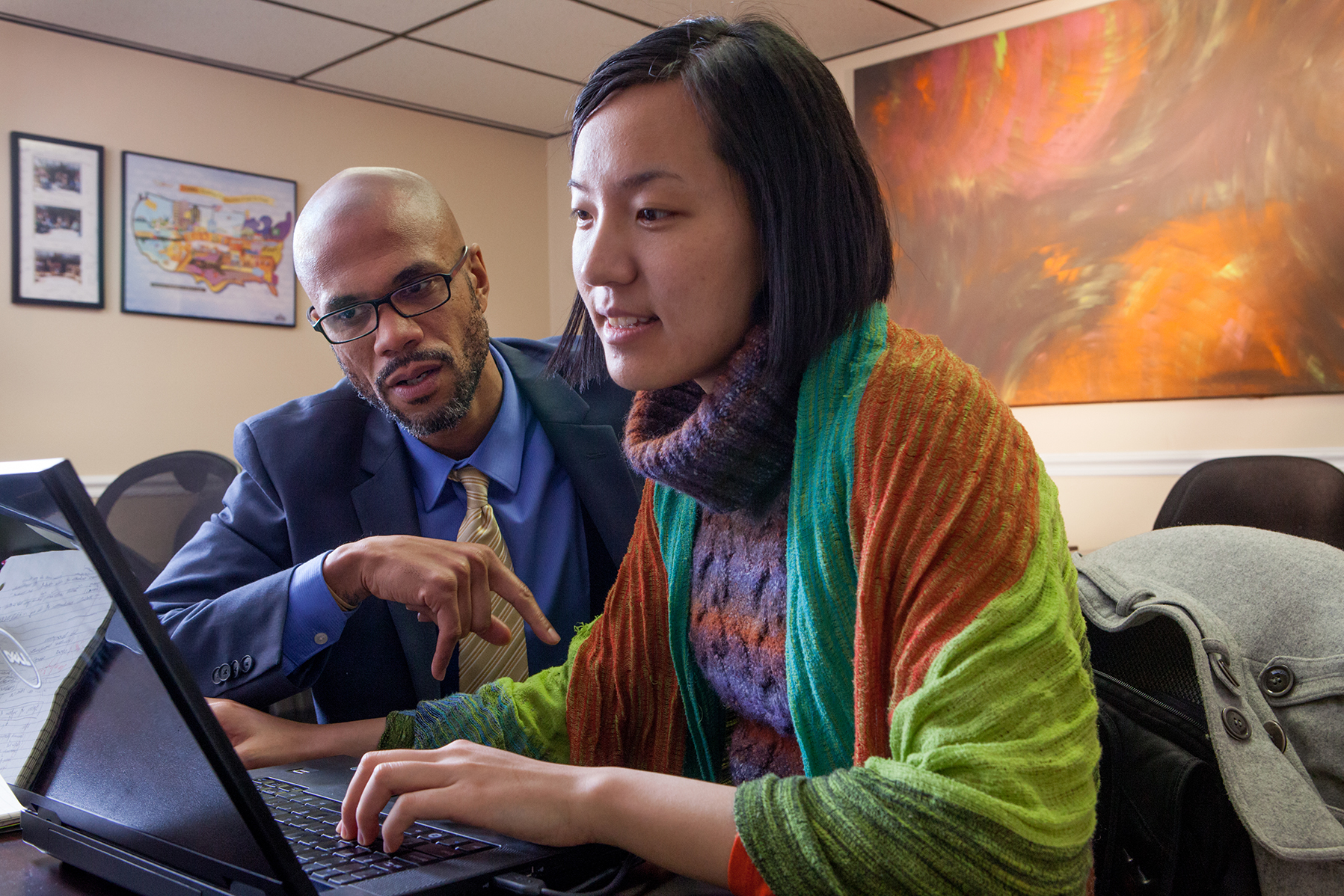Taken by Storm: The Auspicious Path of One Fenwick Broyard to Athens, by way of New Orleans.

By: Cynthia Adams | Photos by: Nancy Evelyn
Sometimes, it’s possible to win, even when you appear to lose. Fenwick Broyard chose to relinquish something very prestigious and valuable- a fully funded graduate education- in order to pursue his true destiny. With and open hand and an open heart, he let go and grasped his dream.
Fenwick Broyard, the newish executive director of Community Connection, was supposed to be a physicist. He started on that track, impressively kitted out with a prestigious scholarship from the Packard Foundation and excellent grades from his private school education.
He left New Orleans, the Little Apple, after earning an undergraduate degree in physics at Xavier University and went to the Big Apple intending to earn a PhD at Columbia University. In New York, he noticed that his roommate’s sociology textbooks interested him more than his physics texts.
By the time a psychological storm blindsided him (the sudden death of a childhood friend) Fenwick Broyard was a changed man. He tacked into the wind and changed course: Broyard relinquished the Packard scholarship, one paying all costs related to a STEM degree. He abandoned pursuit of a doctorate in physics to study public health. And he left Columbia.
Sailor’s wisdom dictates that we cannot control the winds, but we can adjust our sails, and so Broyard did. He eventually found his true calling and storm shelter far inland—540 miles from his New Orleans home, in the small town of Athens, Ga. He found both community and an utterly amazing opportunity for connection. This is his story.

MLK day of work at a community garden with Fenwick Broyard and Ethel Collins (founding member of garden, local resident)
Finding a New Path to Achievement
One teacher made all the difference, Broyard explains. As a young high school student in New Orleans, he learned critical thinking skills, which in turn led to prestigious scholarships and opportunities. And he credits this largely to one New Orleans high school teacher, known to his students as “J.C.”
“John Charles, or J.C., as we called him, excited and challenged me. He taught physics.” Broyard says, and he was soon hooked by physics. In retrospect, he says it is because it was the first time he felt intellectually engaged. In his senior year of college, after having completed all of his major courses, he began taking liberal arts courses, which he also enjoyed. But excelling in physics carried a huge bonus.
“I discovered at graduation from college that I won an award from the Packard Foundation to go and pursue a degree anywhere I wanted to go. But it had to be in STEM.” (STEM academic fields include science, technology, engineering and mathematics.)
Broyard entered the doctoral program in physics at Columbia University. When his childhood friend, Kendall Regis, died suddenly, Broyard was stunned. Regis had chased the dream to play professional sports despite a known health issue. “He knew that his athletic dream was dangerous.”
Broyard decided to walk away from the STEM money and follow his own dream at all costs.
After two years at Columbia, he felt a tug to return to New Orleans and study social issues.
“Kendall’s death was the nail in the coffin of my PhD pursuit, and it was upon leaving New York that I started teaching in the Ninth Ward in New Orleans.” Broyard returned to New Orleans to teach in 2002.
His family thought he was crazy. In response, he quotes a line from the film Braveheart: “Every man dies, but not every man truly lives.”
Broyard’s parents had paid for his private education through high school. Ninth Ward public schools were a very different reality. As a teacher in New Orleans’s public system, Broyard now scrambled to find enough desks and texts for his students. “I was teaching pre-algebra to public school students who couldn’t do long division. And I couldn’t send books home. And the copier didn’t even work three days a week.”
The broken down copier problem was exacerbated by the fact that, “I had 16 textbooks and 28 desks for an average of 32 students.”
A frustrated Broyard quit teaching after one year, and spent the following year “working odd jobs, and traveling, and earning money as a spoken word poet. And, it was at the conclusion of that second year in the city that I enrolled in the graduate public health program at Tulane.”
The arrival of a storm named Katrina in August 2005 coincided with the scheduled start date of Broyard’s graduate studies. “The hurricane hit the day of orientation for the public health program. We ended up in Atlanta. It became apparent we weren’t going to have a home to return to.”
Katrina became one of the deadliest U.S. hurricanes in history. Nearly 1,900 died; more were displaced or never found.
“Katrina didn’t create the poverty in New Orleans. It exposed it.”
Was there anything left to know about New Orleans post Katrina that hasn’t been dissected by the media? The first person perspective of a native son, one who had just returned to a new course of study and life direction, still jars.
The Broyard family had the means to leave and escape the storm and did. They retreated to Atlanta, in a terrifying “exodus to get out of New Orleans during Katrina.”
Pre-Katrina, residents had struggled to survive. Many of the New Orleans poor could not escape the storm because they lacked gas or motel money to evacuate. Broyard folds his hands.
Perhaps, he adds seriously, creativity is borne out of suffering; “the juxtaposition of suffering.”
As homes were destroyed and their contents swirled in a toxic morass of water and detritus, student records were lost along with other essential records. College students were left in the lurch. Many colleges made exceptions to allow students to continue studies although their records were irretrievable at fi rst. Emory College in Atlanta allowed Broyard to provisionally transfer into a graduate program there for one semester.
“Then in January, after Katrina, Tulane was reopening. I lived in a Tulane dormitory, and it was better than the FEMA housing.”
Others in his family did not fare so well, as their repaired homes molded and became uninhabitable soon after they were completed.
Broyard watched his family members and a battered New Orleans as it suffered a second, man-made disaster. Once again many were displaced. “The Chinese company providing the dry wall sent defective material, so houses were once again destroyed.”
The New Orleans he had returned to was leveled, and resources were even fewer than pre-Katrina. Broyard explains that New Orleans “was a food desert for long after Katrina. I became interested in urban agriculture. I worked on the farmer’s market project and my partner ran the Edible School Yard program.” He had a child, Addis, now age three.
He completed a master’s of public health degree from Tulane. “My favorite minister’s quote was, “be excellent where you are,” Broyard says with a smile.
Physically, Broyard is tall, thin, and has a neatly trimmed mustache and beard. After his master’s, he spent four months in Peru, then Brazil.
“I was interested in the theater of the oppressed; envisioned theater as a tool for social change. I bought a plane ticket and went to Brazil, but did not speak Portuguese. I got a 90-day ticket—no plans.”
When he returned from Brazil, Broyard learned he had won a Ford Foundation fellowship to study international health and development. He kept seeing a connection to nutrition. “I saw chronic diseases were also diet related.” He used his travels and exposure to other cultures to develop ideas for farmer’s markets back home in New Orleans.

The Big Easy’s Big Pull
The New Orleans born and bred Broyard says his hometown’s visceral pull is “almost like a bungee cord.” Its allure is undeniable, yet there remains a swift undercurrent of suffering. But it is the city’s “violent swing between places,” Broyard observes, that is so extreme he says he now “finds it hard to live in a place with that much disparity.”
Broyard made his final departure from New Orleans with his ex-girlfriend and young daughter in tow. “We were all living together in New Orleans. We left the city together to fi nd safe harbor elsewhere.” The “elsewhere” was Atlanta. During the fall of 2011, Broyard noticed a job listing that caught his eye. The posting was for an opportunity to work with the Athens Land Trust, with the task of setting up a community garden project. It felt like a perfect fit and he was chosen. He also made the decision to apply to the UGA School of Social Work.
“I had the social background,” he explains, “and while working at this farm, I learned I was accepted in Graduate School.” Broyard worked with the Community Agriculture Program at the Athens Land Trust and entered his second master’s program. During his time at the Land Trust, he spearheaded the establishment of the West Broad Market Garden and Farmer’s Market, as well as the Young Urban Farmer Development Project in partnership with the Clarke County School District.
By December of 2011 he had set up a garden behind the West Broad School. Broyard adds this school is the oldest standing African-American educational building in the county.
He worked with the Land Trust until graduation from the MSW program in the spring of 2013. He also plunged headlong into work for his newest role as executive director of the Community Connection of Northeast Georgia. He has only been in his new position a short while, but slipped into it with seeming ease.
The agency has oversight of 124 Athens community-based agencies, he explains. “The founders started the organization with the aim of being an information clearinghouse. The focus, at the outset, was on aggregating all the available information on providers offering services to the disabled. However, we were always viewed as an information and referral agency, which is how we ended up being awarded the United Way 211 contract when that program developed.”
Today, Community Connection is staffed primarily by 10 volunteer interns, and 3.5 paid staffers. There are numerous UGA student interns working at Community Connection. UGA graduate students are among the many volunteers who help power the agency’s work. The agency, having tightened its belt since Broyard took directorship, is largely volunteer reliant. A whippet thin Broyard seems to have no problem with belt tightening.
Three of the Community Connection interns are currently working towards master’s in social work degrees. One student, Lingman Guo, (also known as Lynn) works there as an intern 40 hours weekly while completing her master’s degree in nonprofit organization.
Broyard walks through the agency and rattles off several recent developments in the resonant, strong voice of a newscaster. He describes steps taken to make the agency more financially strong and even leaner.
That morning, he took a call from a former mayor, the founding director of Community Connection, Gwen O’Looney. Broyard also communicates frequently with the current mayor of Athens, Nancy Denson—a point that reinforces the gravitas of both his position and the agency’s role within the greater community.
These days, Broyard favors three-piece suits, crisp shirts and ties. He sits at a conference table at Community Connection during the winter, preparing for a major fundraiser and also bracing for a massive winter storm about to slam through the Southeast.
The snow storm, it turned out, was temporarily dangerous, inconvenient and paralyzed Georgia—one extreme by southern winter standards. Yet compared to a category three hurricane like Katrina, it was a nuisance, easily forgotten, with few exceptions.
Storms without names seldom alter thousands of destinies, like that of one exceptional scholar named Fenwick Broyard.
Fenwick Broyard has spent recent years opening doors for others. Now, he continues this servant leadership at the helm of Athens’ most comprehensive nonprofit, Community Connection.

Fenwick Broyard at Community Connection. (PhD in Social Work, Non-Profit) with graduate student Lynn Guo.
Community Connection
The mission of Community Connection of Northeast Georgia is to strengthen the individuals and organizations of our region to ensure that no need goes unmet. For the past 30 years, Community Connection has been at the forefront of the community-wide effort to identify and address needs in and around the Athens-Clarke County area.
Community Connection pursues this mission in three ways:
- 211 Information and Referral Hotline Community Connection seeks to help people in need by joining individuals or families together with the right agency that can help the most — right now.
- HandsOn Northeast Georgia Community Connection connects volunteers with the non-profit service organization that best matches their individual interests or skills.
- Non-Profit Development Alliance When community members join forces to create a non-profit organization Community Connection understands the commitment that’s required and challenges that lay ahead. Through the Non-Profit Development Alliance, Community Connection provides referral resources, leadership learning and even technical assistance.
“I’m most proud of the fact that we have incubated other programs,,” Broyard says. “The agency now has oversight of 124 community-based agencies,” he explains. “The focus, at the outset, was on aggregating all the available information on providers offering services to the disabled. However, we were always viewed as an information and referral agency, which is how we ended up being awarded the United Way 211 contract when that program developed.”








